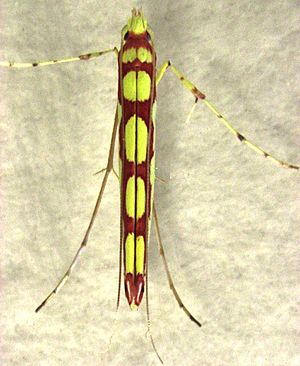Macarostola miniella facts for kids
Quick facts for kids Macarostola miniella |
|
|---|---|
 |
|
| Scientific classification | |
| Synonyms | |
|
Macarostola miniella is a type of moth. It belongs to a family of moths called Gracillariidae. This moth is special because it is only found in New Zealand. You can find it in the North Island. Adult moths of this species can look a bit different, with two main color types.
Contents
How it Got its Name
This moth was first described in 1875. Three scientists, Baron Cajetan von Felder, Rudolf Felder, and Alois Friedrich Rogenhofer, gave it the name Stathmopoda miniella.
Later, in 1880, another scientist named Edward Meyrick thought he had found a new species. He called it Gracilaria ethela. But in 1889, Meyrick realized it was the same moth. So, he agreed that Stathmopoda miniella was the correct name.
In 1988, John S. Dugdale placed this moth into the group (genus) called Macraostola. This is why its full name today is Macarostola miniella.
What it Looks Like
Adult Macarostola miniella moths are quite small. They are usually about 11 to 13 millimeters long. That's roughly half an inch.
The most common type of this moth is bright and colorful. It has a mix of crimson (a deep red) and yellow colors.
- Its head is yellow on top and crimson at the back.
- The front wings are pale yellow. They have a bright crimson stripe that wiggles from the base to the tip. This stripe is connected to the inner edge of the wing by crimson bars.
- There's also a round crimson spot near the tip of the wing.
- The back wings are light crimson.
There is also another version of this moth. Instead of bright crimson, this version has duller, brownish (fuscous) colors.
Where it Lives
This moth is only found in New Zealand. It is very common in the North Island. You won't find M. miniella anywhere else in the world.
Life Cycle and Behavior
The young moths, called larvae, have a special way of eating. They are leaf miners. This means they tunnel and eat inside the leaves of plants.
As they grow, the larvae also roll up the leaves of their host plant. They use these rolled leaves for two things:
- To keep eating safely.
- To change into a pupa, which is the stage before they become an adult moth.
Home and Food
You can find Macarostola miniella moths living in native forests.
The larvae of this moth eat only one type of plant. They are leaf miners on a tree called Syzygium maire. This tree is also special because it is only found in New Zealand.

